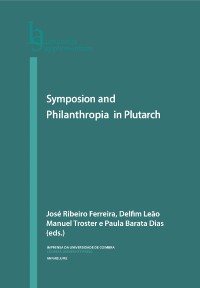Please use this identifier to cite or link to this item:
https://hdl.handle.net/10316.2/31999| DC Field | Value | Language |
|---|---|---|
| dc.contributor.author | Blois, Lukas de | |
| dc.date.accessioned | 2014-06-30T09:18:56Z | |
| dc.date.accessioned | 2020-09-21T03:21:05Z | - |
| dc.date.available | 2014-06-30T09:18:56Z | |
| dc.date.available | 2020-09-21T03:21:05Z | - |
| dc.date.issued | 2009 | - |
| dc.identifier.isbn | 978-989-26-0908-9 (PDF) | |
| dc.identifier.uri | https://hdl.handle.net/10316.2/31999 | - |
| dc.description.abstract | In his Life of Otho, chapter 3, Plutarch describes a dinner that the emperor Otho had with 80 senators, some of whom had brought their ladies with them. The dinner was disturbed by soldiers of the praetorian guard, who felt very uneasy and distrustful against the senators, and thought that they had to save the emperor from a senatorial conspiracy after having seen weapons loaded upon wagons. Violating the exclusivity of the imperial dinner, in other words breaking through an important status barrier, they inverted the positive effect of this great banquet, and thus damaged Otho’s reputation among the upper classes beyond repair. In Plutarch’s Galba and Otho, which should be read as one opus, this dinner story negatively inverts an important means of imperial representation and thus indicates how weak Otho’s position really was. It presents as well a clear symptom of the serious deterioration of military discipline that in this year of civil strife (AD 68-69) manifested itself and may be seen as a consequence of bad leadership at the top (by Galba and Otho) and at the second level of authority (by people such as Nymphidius Sabinus, Vinius, Laco, Icelus and Otho’s cronies). By choosing an imperial banquet, which should be a place of friendship with high status amici Caesaris, a show-case of imperial power and paideia, and a mirror of hierarchies within the urban Roman elite, as the scene where the utter escalation of military misbehaviour and the total loss of imperial authority over the military mob came to light, Plutarch accentuates the social and representational importance of such banquets. | eng |
| dc.language.iso | eng | - |
| dc.publisher | Imprensa da Universidade de Coimbra | por |
| dc.publisher | Centro de Estudos Clássicos e Humanísticos | por |
| dc.relation.ispartof | http://hdl.handle.net/10316.2/2353 | por |
| dc.rights | open access | - |
| dc.title | Crossing status barriers: the disruption of an imperial banquet by angry soldiers in Plutarch’s Otho | por |
| dc.type | bookPart | por |
| uc.publication.firstPage | 223 | - |
| uc.publication.lastPage | 229 | - |
| uc.publication.location | Coimbra | por |
| dc.identifier.doi | 10.14195/978-989-8281-17-3_20 | - |
| uc.publication.digCollection | PB | por |
| uc.publication.orderno | 20 | - |
| uc.publication.area | Artes e Humanidades | por |
| uc.publication.bookTitle | Symposion and philanthropia in Plutarch | - |
| uc.publication.manifest | https://dl.uc.pt/json/iiif/10316.2/31999/227545/manifest?manifest=/json/iiif/10316.2/31999/227545/manifest | - |
| uc.publication.thumbnail | https://dl.uc.pt/retrieve/11425278 | - |
| uc.publication.parentItemId | 50955 | - |
| uc.itemId | 73651 | - |
| item.fulltext | With Fulltext | - |
| item.grantfulltext | open | - |
| Appears in Collections: | Symposion and philanthropia in Plutarch | |
Files in This Item:
| File | Description | Size | Format | |
|---|---|---|---|---|
| 20-_symposion_and_philanthropia.pdf | 170.91 kB | Adobe PDF |  |
Items in DSpace are protected by copyright, with all rights reserved, unless otherwise indicated.
